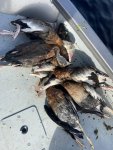Lukikus2
Senior Member
Did some googling. So it's basically a bird from Mexico and not indigenous to the states. It is also not "water foul" if it sits in a tree. And they are taking over in groves. My vote is no closed season for them.
Did some googling. So it's basically a bird from Mexico and not indigenous to the states. It is also not "water foul" if it sits in a tree. And they are taking over in groves. My vote is no closed season for them.
I’m glad you “did some googling” ?. I think by “sit” you mean roost? A wood duck roosts and “sits” in trees too, sometimes, as do blackbellys. Are you saying that wood ducks aren’t waterfowl too?
Blackbellys and wood ducks also share the same nesting holes in trees, but I’ve read that blackbellys have their clutch earlier and aren’t any competition to wood ducks hatching their eggs in the same holes.
Woodies nest in crevices and holes in trees not to mention they are native to North America. Actually one of our prized possessions. To let a non native duck to populate and take space in our ecosystem that can hurt future populations of wood ducks that duck hunters have paid good money for the last 50 years to bring them from the brink of extinction is ludicrous.

Woodies nest in crevices and holes in trees not to mention they are native to North America. Actually one of our prized possessions. To let a non native duck to populate and take space in our ecosystem that can hurt future populations of wood ducks that duck hunters have paid good money for the last 50 years to bring them from the brink of extinction is ludicrous.
We killed 9 more for you this morning Lukik. We’re winning the undocumented duck battle! ? View attachment 1123249
How do they taste? I bet they cook up pretty good.
I doubt they will ever have an ounce of negative impact on any other waterfowl. Nothing to get upset about. They migrated here, and like ring neck doves they’ll find a place and become part of the landscape.
As for nesting, I’ve only personally seen them ground nest much like a guinea fowl or chicken would. Not necessarily in the stealthiest of places either! We’ve had healthy numbers of them here for more than a decade. I count them a blessing, but they definitely aren’t managed properly with normal duck season dates. Maybe at some point that will need to be addressed.